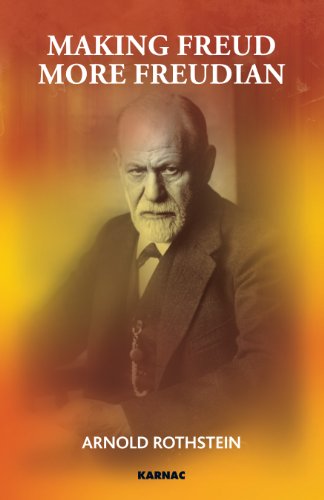Making Freud More Freudian

Book Details
- Publisher : Routledge
- Published : 2010
- Cover : Paperback
- Pages : 144
- Category :
Psychoanalysis - Catalogue No : 28053
- ISBN 13 : 9781855757318
- ISBN 10 : 1855757311
Reviews and Endorsements
'In Making Freud More Freudian Rothstein undertakes the crucial task that psychoanalysts have tended to avoid, to the detriment of the field. He identifies which of Freud's ideas have enduring value, which are in need of revision, and which must be discarded. The motivational concept of compromise formation is the fundamental platform upon which Rothstein builds. His orientation is consistently clinical. Using the work of Brenner and others, as well as his own contributions concerning narcissism, shame and guilt, sadomasochism, diagnosis, and establishing the treatment, Rothstein
constructs a guide to successful contemporary analytic practice. As the title of his book indicates, Rothstein has done Freud's legacy a great service.'
- Owen Renik, MD, Former Editor-in-Chief, The Psychoanalytic Quarterly
'Arnold Rothstein has constructed a volume that is both simultaneously evolutionary and revolutionary. He expertly blazes new pathways for Freudian thought and shows how this theoretical position is both a powerful explicator of human experience and a useful way of viewing clinical interactions. This volume is extraordinarily important on a number of levels while being amazingly concise and extremely well written. I found myself reading and rereading this amazing and engrossing clinical-theoretical narrative.'
- Steven J. Ellman, PhD, Professor Emeritus City University of New York, author of When Theories Touch: A Historical and Theoretical Integration of Psychoanalytic Thought
'For those who have wondered what, exactly, compromise formation theory is, how it developed from older ego psychology, and how it differs from other current teachings, Rothstein's book is the perfect resource. Clearly and concisely written by a foremost student of Charles Brenner, and generously illustrated by clinical examples, Rothstein's book shows how this optimistic, patient-oriented, specifically psychoanalytic way of working can also be extended to the "tough" areas of analytic practice - narcissism, masochism, dismal diagnoses, and reluctant analysands.'
- Lawrence Friedman, MD, Clinical Professor of Psychiatry, Weill Cornell Medical Center, New York

